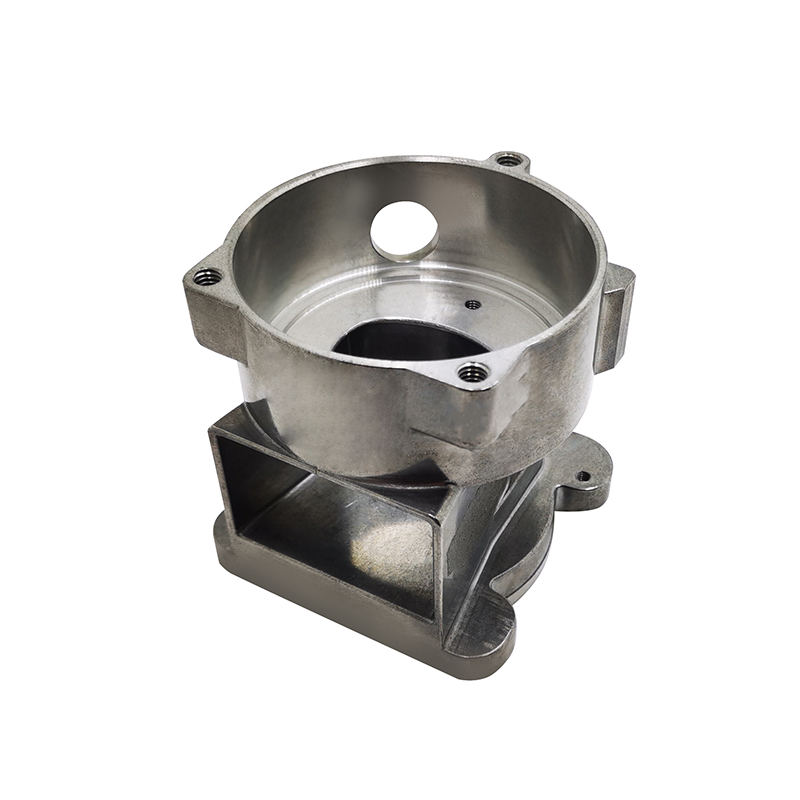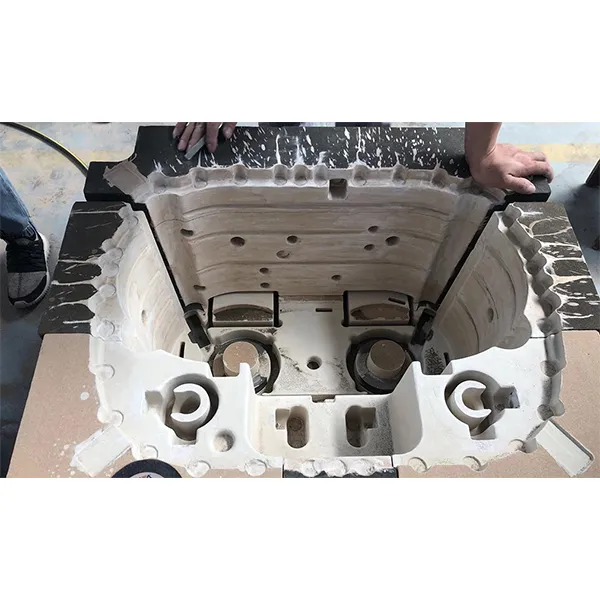Aluminum Casting Company innovations that drive industrial design
The Future of Aluminum Foundries: Patterns and Developments Shaping the Sector
The aluminum shop industry is undertaking considerable improvement. Trick fads highlight the significance of sustainability and effectiveness. Technologies in wise manufacturing and automation are ending up being prevalent. Foundries are significantly concentrated on utilizing recycled materials. This shift increases questions about future techniques and innovations. Exactly how will these adjustments effect manufacturing methods and market characteristics? The solutions may redefine the industry landscape in unanticipated means.
Advancements in Smart Production Technologies
As the aluminum shop sector develops, improvements in clever production modern technologies are becoming increasingly important for enhancing productivity and performance. The integration of automation, fabricated intelligence, and the Web of Things (IoT) is transforming conventional shop operations. These technologies allow real-time tracking of procedures, permitting immediate adjustments that optimize result and lower waste.
In addition, artificial intelligence formulas examine production information to determine patterns and predict maintenance needs, minimizing downtime. Robotics are significantly utilized for repeated jobs, releasing skilled employees to focus on more intricate obstacles. Additionally, digital doubles-- online versions of physical processes-- facilitate simulations that can enhance style and functional approaches.
The fostering of these wise manufacturing modern technologies is driving competitive advantages in the aluminum factory industry. By simplifying process and enhancing decision-making capacities, foundries can satisfy expanding market needs while maintaining top notch requirements. The future of light weight aluminum foundries is unquestionably linked to these technical developments.
Embracing Eco-Friendly Products and Processes
The light weight aluminum factory market is increasingly concentrating on green products and procedures to boost sustainability. This shift includes the fostering of lasting material sourcing, energy-efficient production techniques, and reliable recycling and waste administration techniques. By incorporating these techniques, foundries intend to lower their environmental impact while maintaining competition in the marketplace.
Lasting Material Sourcing
How can aluminum shops enhance their sustainability initiatives? Lasting product sourcing has become a necessary approach in attaining this objective. By prioritizing recycled aluminum, shops can substantially lower their environmental impact, as recycled materials call for less power and less sources compared to primary aluminum production. In enhancement, sourcing products from accredited distributors that follow environmentally friendly techniques advertises responsible mining and lessens environmental influence. Factories are also checking out alternative products, such as biopolymers and eco-friendly layers, to complement typical aluminum processes. Collaborating with stakeholders, including vendors and environmental companies, cultivates development in sourcing techniques. Ultimately, accepting sustainable material sourcing not only lines up with international sustainability objectives but likewise settings aluminum factories as leaders in eco liable manufacturing.
Energy-Efficient Production Methods
Aluminum foundries are significantly adopting energy-efficient manufacturing techniques to enhance their sustainable material sourcing initiatives. These techniques concentrate on minimizing power usage throughout the production process. Advanced technologies, such as induction melting and maximized spreading procedures, are being executed to reduce the total carbon impact. Furthermore, automation and wise production systems improve operational performance, permitting better energy monitoring. Foundries are likewise checking out the combination of sustainable power resources, such as solar and wind, to power their operations. By focusing on power efficiency, light weight aluminum shops not only lower manufacturing prices however additionally straighten themselves with international sustainability objectives, ensuring a more environmentally responsible approach to aluminum production while meeting the rising demand for environment-friendly practices in the sector.
Recycling and Waste Administration
Accepting environment-friendly products and processes, aluminum foundries are prioritizing recycling and waste management strategies to boost sustainability in their operations. By integrating closed-loop systems, these centers are decreasing waste and making the most of resource performance. Scrap aluminum, an easily available material, is being reused on-site, greatly minimizing the need for virgin products and decreasing energy intake. Innovations in sorting and refining technologies additionally promote the recycling of aluminum, ensuring that also infected materials can be repurposed successfully. Furthermore, foundries are embracing sustainable methods such as reducing harmful waste and advertising the usage of naturally degradable materials for product packaging. This commitment to recycling not just lowers ecological effect but likewise enhances the financial practicality of aluminum foundries in an affordable market.
The Duty of Automation and Robotics
Automation and robotics are progressively transforming the light weight aluminum shop industry, substantially enhancing manufacturing performance. By integrating innovative modern technologies, foundries can reduce labor prices while simultaneously enhancing safety standards for their labor force. This change not just enhances operations but additionally places the market for sustainable development in a competitive market.
Improved Production Effectiveness
Changing manufacturing procedures, the integration of sophisticated robotics and automation innovations has actually come to be a foundation for light weight aluminum foundries seeking improved efficiency. These technologies enhance process, minimize cycle times, and improve product high quality by minimizing human mistake. Automated systems can monitor assembly line in real-time, allowing for prompt adjustments that enhance result. In enhancement, robotics facilitate the handling of hazardous materials, guaranteeing safer workplace while increasing throughput. Anticipating upkeep innovations also add to performance by expecting equipment failings, consequently decreasing downtime. As an outcome, aluminum foundries can attain better consistency in their products while responding much more swiftly to market needs. This welcome of automation is establishing a new criterion for performance and operational excellence within the industry.

Lowering Labor Prices
The shift in the direction of progressed robotics and automation in light weight aluminum shops not just improves production effectiveness however additionally plays a significant duty in lowering labor expenses. By incorporating automated systems, foundries can decrease the reliance on manual work, which typically includes high earnings and training costs. Robotics enhance recurring tasks such as pouring, molding, and ending up, permitting for a greater result with less personnel. This technical adjustment not only minimizes labor-related costs but additionally improves consistency and high quality in production. Additionally, automation can run all the time, making best use of functional hours without the associated prices of overtime or shift differentials. As an outcome, light weight aluminum shops can attain considerable savings while maintaining affordable prices in a developing market landscape.
Improving Safety Standards
While standard aluminum shop procedures frequently reveal employees to unsafe settings, the integration of robotics and automation considerably enhances safety and security requirements within the sector. Automated systems can perform risky tasks, such as liquified steel handling and heavy training, lowering human direct exposure to unsafe conditions. In addition, robotics can operate in harmful atmospheres and severe temperature levels, efficiently reducing the threat of injury. Advanced checking innovations and fabricated intelligence assurance real-time safety and security analyses, enabling for prompt actions to prospective hazards. Moreover, automation enhances workflows, lowering the likelihood of mishaps triggered by human error. Because of this, the adoption of these innovations not just enhances safety and security however additionally cultivates a more productive and effective working environment in light weight aluminum factories.
Enhancing Energy Effectiveness in Manufacturing
As light weight aluminum foundries seek to keep competitiveness in an advancing market, improving energy effectiveness in manufacturing has arised as an essential emphasis. By taking on sophisticated innovations such as high-efficiency melting heating systems and automated temperature controls, shops can notably reduce power intake. Implementing real-time monitoring systems enables accurate monitoring of energy use throughout the manufacturing process, enabling fast changes to maximize effectiveness.
Furthermore, moving to different energy resources, including renewable choices, can further reduce the carbon footprint. The combination of energy recovery systems, which reclaim waste warm for reuse, is coming to be increasingly typical. Training employees in energy management methods ensures that everybody involved in the production procedure is mindful of energy use.
These efforts not just reduced functional prices yet likewise line up with global sustainability goals, placing light weight aluminum foundries as liable players in the industry while boosting their general competitiveness. - Precision aluminum casting
Innovations in Recycling Aluminum
Technologies in reusing aluminum have actually gained momentum alongside initiatives to boost power effectiveness in production. The aluminum sector has actually welcomed advanced technologies that enhance the recycling process, lowering energy intake and ecological influence. Strategies such as hydrometallurgy and new sorting innovations boost the removal of light weight aluminum from scrap, boosting yield rates and making sure greater quality recycled material.
The growth of closed-loop recycling systems permits foundries to reuse aluminum without substantial deterioration in high quality, making the process more sustainable. Innovations in logistics and collection, consisting of boosted monitoring systems and automated sorting, have actually additionally played a necessary role in enhancing the effectiveness of light weight aluminum recovery. These advancements not only add to a round economic climate however additionally help mitigate the carbon footprint connected with aluminum production. As the demand for sustainable practices expands, these innovations place the light weight aluminum foundry industry as a leader in responsible resource management.
Reacting To Market Demands and Consumer Trends
Versatility has come to be a foundation for light weight aluminum factories reacting to evolving market needs and consumer trends. As industries significantly prioritize sustainability, aluminum shops are shifting towards environment-friendly practices, including improved recycling procedures and lowered carbon footprints. This shift straightens with customer preferences for environmentally responsible products, driving shops to innovate their offerings.
Additionally, the rise of light-weight products in aerospace and automotive sectors requires developments in light weight aluminum alloys and casting strategies. Shops are buying r & d to produce high-strength, lightweight components that meet stringent performance requirements.
Furthermore, modification has actually gotten grip, with customers seeking tailored options. Light weight Precision aluminum casting aluminum factories are leveraging sophisticated production technologies, such as 3D printing, to suit particular client requirements effectively. This responsiveness not just satisfies customer demands yet additionally positions aluminum factories competitively in a vibrant market landscape, guaranteeing their importance in an ever-changing commercial environment.

Frequently Asked Questions
Just How Do Aluminum Foundries Effect Resident Economies?
Light weight aluminum shops substantially affect regional economic climates by creating jobs, stimulating demand for local vendors, and adding to community development. Their operations commonly bring about boosted tax incomes, which can money essential public services and framework renovations.
What Are the Security Regulations for Light Weight Aluminum Shop Employees?
Safety laws for aluminum factory workers include required personal protective tools, proper air flow systems, normal training on dangerous products, and adherence to standards established by job-related wellness and safety and security administrations to lessen dangers and warranty worker safety. - Aluminum Casting Company
Just How Does Aluminum Recycling Affect Global Supply Chains?
Aluminum reusing significantly reduces demand for basic materials, enhances resource efficiency, and stabilizes costs. This shift effects worldwide supply chains by cultivating a circular economic climate, promoting sustainability, and making certain an extra resilient market in changing markets.
What Profession Opportunities Exist in the Aluminum Shop Industry?
Numerous occupation possibilities exist in the light weight aluminum factory sector, consisting of roles in engineering, high quality control, production management, and r & d. Skilled labor positions such as mold manufacturers and equipment drivers are likewise in need.
Just How Do International Trade Plans Influence Light Weight Aluminum Foundries?
International trade plans significantly influence light weight aluminum factories by affecting import tariffs, supply chain characteristics, and market accessibility. These variables can influence functional expenses, competition, and overall productivity within the worldwide light weight aluminum manufacturing landscape.
By prioritizing recycled light weight aluminum, shops can considerably lower their environmental footprint, as recycled materials call for much less power and less sources contrasted to primary aluminum manufacturing. Aluminum foundries are significantly adopting energy-efficient manufacturing techniques to complement their sustainable product sourcing initiatives. Automation and robotics are increasingly changing the light weight aluminum factory industry, considerably improving production effectiveness. The shift in the direction of advanced robotics and automation in aluminum foundries not only boosts manufacturing effectiveness yet also plays a considerable function in decreasing labor prices. As aluminum shops seek to preserve competition in an evolving market, improving power efficiency in production has actually emerged as a vital focus.